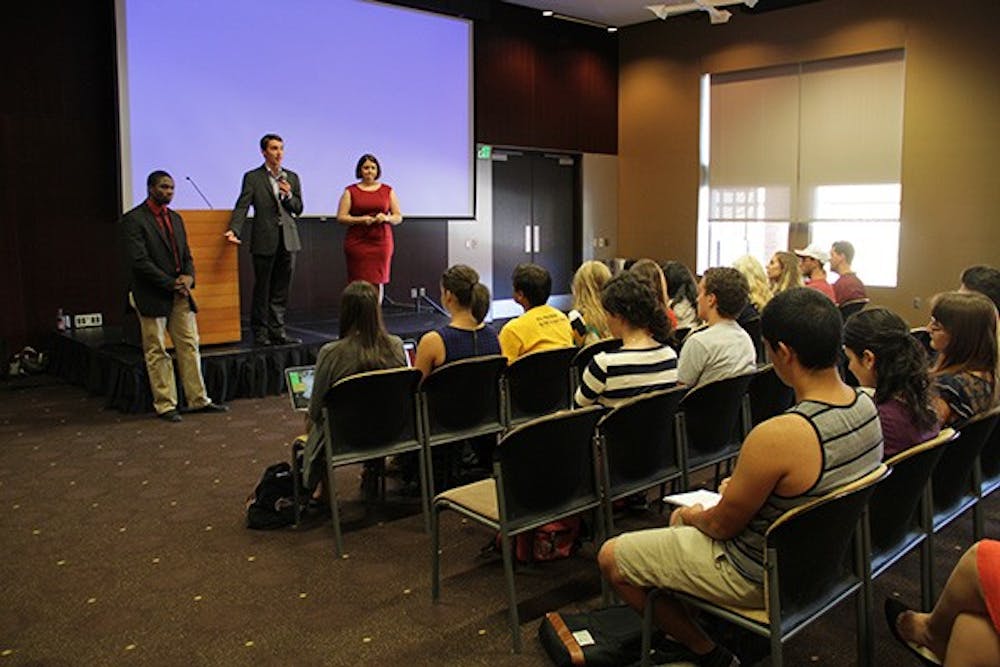 Undergraduate Student Government Polytechnic President Franz Ferguson, Tempe USG President Jordan Davis and Graduate and Professional Student Association President Megan Fisk answer students’ questions during an open forum at the Memorial Union on Monday afternoon about the athletic fee bill, which was proposed earlier this month. (Photo by Shawn Raymundo)
Undergraduate Student Government Polytechnic President Franz Ferguson, Tempe USG President Jordan Davis and Graduate and Professional Student Association President Megan Fisk answer students’ questions during an open forum at the Memorial Union on Monday afternoon about the athletic fee bill, which was proposed earlier this month. (Photo by Shawn Raymundo)
Students questioned their campus governments about a proposed athletic fee at town hall meetings at each campus Monday.
The student governments at the Downtown, Polytechnic and West campuses may vote on this fee as early as Oct. 25, and the Tempe Undergraduate Student Government and the Graduate and Professional Students Association could follow on Oct. 29.
The proposed $75-per-semester fee is designed to replace funding from tuition.
GPSA President Megan Fisk told students the fee would offset athletic costs.
"Right now, just over $10 million is going to athletics, and this fee replaces that money," Fisk said.
Tempe USG President Jordan Davis was quick to point out what will happen if the fee is not implemented in the fall semester.
"If this doesn't go through, students will continue to fund athletics regardless," he said. "What this does is increase transparency so everyone knows where their dollar is going, and no one wants to hear their money isn't going to academic services if they're paying for tuition."
Fisk, Davis and USGP President Franz Ferguson said they are hopeful the fee will help build attendance at sporting events by creating a lottery system for students to receive tickets to football and men's basketball games.
USG is looking for avenues to provide students with tickets, such as a lottery system.
"Say 16,000 log into this hypothetical system, and say they want to go to the UA game, then 15,000 tickets will be random-number generated, and whoever has that number will be selected," Fisk said. "This is how other schools with this system works."
Davis said he wants students at ASU to have more pride in athletics. Similar-sized schools have more involvement, Davis said.
"We're looking at this huge university, largest university in the nation," he said. "We don't have the athletic spirit, the athletic pride, the athletic tradition that a lot of the other universities that are huge like Ohio State, Penn State (and) Alabama have, and there is really no reason ASU shouldn't have that."
Similar to the student governments and other services on campus, there would be a board of students who could determine how the money would be spent, Ferguson said.
"With this, students will have a say in what athletics does," he said. "Marketing, outreach things like that so we'll have more input on how athletics operates and currently we don't have that input."
Davis, Ferguson and Fisk also pointed out the athletic department would be held to its word. If changes requested by students are not implemented, the students would have a chance to speak up and request that funding from the fee for the department be pulled.
"This a part of a funding source, and if (the) athletics department doesn't uphold their end of the bargain, then the money is gone and fee will be revoked," Davis said.
Fisk said a clause has been written within the bill which makes tuition money no longer allowed to be used to supplement the athletic program.
The fee will also benefit other services at all campuses.
The money from the fee will go to a pay raise for graduate student teaching assistants, childcare services, providing free testing for students who want to attend graduate school, extended tutoring hours and weekend shuttles.
The athletic fee will not be available for an increase for a minimum of two years as the athletic department works to use the funds while continuing to raise their own revenue, Fisk said.
After two years, it will be up to future governments to decide whether to increase the fee.
Student governments will continue to work on the bill throughout the week until the initial vote on Friday.
"This is our top priority this year as your student leaders to stop the tuition money from going to athletics and to continue funding them with more transparency," Fisk said.
Reach the reporters at jshanco2@asu.edu and ldjarvis@asu.edu or on Twitter @Joey_Hancock and @misslorijarvis.




